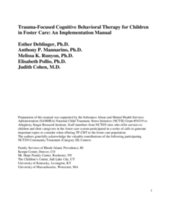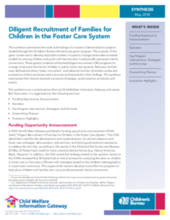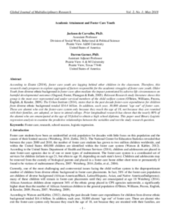Displaying 1371 - 1380 of 2221
This article from the Thomson Reuters Foundation tells the story of Amy Andrews and other young people in foster care who have been trafficked, or made vulnerable to trafficking.
The purpose of this scholarly project was to create a guide for trauma-informed interventions for occupational therapists specifically to use with foster care children.
This manual, supported by the U.S. Substance Abuse and Mental Health Services Administration (SAMHSA) National Child Traumatic Stress Initiative (NCTSI) Grant, offers guidance on the implementation of Trauma-Focused Cognitive Behavioral Therapy (TF-CBT) with children in foster care and their families.
This paper evaluates a five-module curriculum for recently immigrated youth called FUERTE (Family Reunification and Resiliency Training).
This synthesis from the U.S. Children's Bureau summarizes the work and findings of a cluster of demonstration projects aimed at developing replicable models of systemic change and evidence-based models for placing children and youth with families who could provide permanent family connections.
This research study proposes to explore aggregate of factors responsible for the academic struggles of foster care youth.
The primary aim of the current study was to examine the longitudinal effects of ongoing physical abuse on the co-development of externalizing behavior problems and posttraumatic stress (PTS) symptoms among child welfare-involved adolescents.
This paper uses person-centered latent class analysis (LCA) methods to examine the relationship between different profiles of ACE exposures and divergent health trajectories amongst this high-risk population.
This study presents longitudinal analyses of the case flow of youth aged 3–17 in Washington State's foster care system, tracking rates of screening, scoring above or below clinical criteria cutoff scores, and service receipt.
Nearly 1,500 unaccompanied migrant children in the US are unaccounted for by the federal agency that is responsible for their care, according to this article from the Morning Call.



